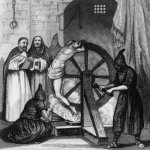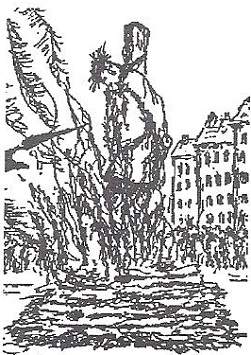C
I will try my best to not be biased with this, instead of using my own opinions, I will instead be using catholic teachings, Please use your own mind and heart to see if this is truly what God wanted, open your bibles, compare the two!
Immaculate conception of mary
The Catechism of the Catholic Church says of the Immaculate Conception of Mary:
490. To become the mother of the Savior, Mary "was enriched by God with gifts appropriate to such a role." The angel Gabriel at the moment of the annunciation salutes her as "full of grace." In fact, in order for Mary to be able to give the free assent of her faith to the announcement of her vocation, it was necessary that she be wholly borne by God's grace.
491. Through the centuries the Church has become ever more aware that Mary, "full of grace" through God, was redeemed from the moment of her conception. That is what the dogma of the Immaculate Conception confesses, as Pope Pius IX proclaimed in 1844:
"The most Blessed Virgin Mary was, from the first moment of her conception, by a singular grace and privilege of almighty God and by virtue of the merits of Jesus Christ, Savior of the human race, preserved immune from all stain of original sin." (Pius IX, Ineffabilis Deus, 1854.)
492. The "splendor of an entirely unique holiness" by which Mary is "enriched from the first instant of her conception" comes wholly from Christ: she is "redeemed, in a more exalted fashion, by reason of the merits of her Son." The Father blessed Mary more than any other created person "in Christ with every spiritual blessing in the heavenly places" and chose her "in Christ before the foundation of the world, to be holy and blameless before him in love."
493. The Fathers of the Eastern tradition call the Mother of God "the All-Holy" (Panagia) and celebrate her as "free from any stain of sin, as though fashioned by the Holy Spirit and formed as a new creature". By the grace of God Mary remained free of every personal sin her whole life long.
"As it is written, There is none righteous, no, not one: There is none that understandeth, there is none that seeketh after God. They are all gone out of the way, they are together become unprofitable; there is none that doeth good, no, not one." -Romans 3:10-12
"For he hath made him to be sin for us, who knew no sin; that we might be made the righteousness of God in him." -2nd Corinthians 5:21
"For we have not an high priest which cannot be touched with the feeling of our infirmities; but was in all points tempted like as we are, yet without sin." -Hebrews 4:15
"But we are all as an unclean thing, and all our righteousnesses are as filthy rags; and we all do fade as a leaf; and our iniquities, like the wind, have taken us away." -Isaiah 64:6
The Immaculate Conception means that Mary, whose conception was brought about the normal way, was conceived without original sin or its stain—that’s what "immaculate" means: without stain. The essence of original sin consists in the deprivation of sanctifying grace, and its stain is a corrupt nature. Mary was preserved from these defects by God’s grace; from the first instant of her existence she was in the state of sanctifying grace and was free from the corrupt nature original sin brings...
Since this term is in the perfect tense, it indicates that Mary was graced in the past but with continuing effects in the present. So, the grace Mary enjoyed was not a result of the angel’s visit. In fact, Catholics hold, it extended over the whole of her life, from conception onward. She was in a state of sanctifying grace from the first moment of her existence. [emphasis added]
SOURCE: Immaculate Conception and Assumption | Catholic Answers
The Bible Only?
Since the Immaculate Conception and Assumption are not explicit in Scripture, Fundamentalists conclude that the doctrines are false. Here, of course, we get into an entirely separate matter, the question of sola scriptura, or the Protestant "Bible only" theory. There is no room in this tract to consider that idea. Let it just be said that if the position of the Catholic Church is true, then the notion of sola scriptura is false. There is then no problem with the Church officially defining a doctrine which is not explicitly in Scripture, so long as it is not in contradiction to Scripture. [emphasis added]
SOURCE: Immaculate Conception and Assumption | Catholic Answers
Immaculate conception of mary
The Catechism of the Catholic Church says of the Immaculate Conception of Mary:
490. To become the mother of the Savior, Mary "was enriched by God with gifts appropriate to such a role." The angel Gabriel at the moment of the annunciation salutes her as "full of grace." In fact, in order for Mary to be able to give the free assent of her faith to the announcement of her vocation, it was necessary that she be wholly borne by God's grace.
491. Through the centuries the Church has become ever more aware that Mary, "full of grace" through God, was redeemed from the moment of her conception. That is what the dogma of the Immaculate Conception confesses, as Pope Pius IX proclaimed in 1844:
"The most Blessed Virgin Mary was, from the first moment of her conception, by a singular grace and privilege of almighty God and by virtue of the merits of Jesus Christ, Savior of the human race, preserved immune from all stain of original sin." (Pius IX, Ineffabilis Deus, 1854.)
492. The "splendor of an entirely unique holiness" by which Mary is "enriched from the first instant of her conception" comes wholly from Christ: she is "redeemed, in a more exalted fashion, by reason of the merits of her Son." The Father blessed Mary more than any other created person "in Christ with every spiritual blessing in the heavenly places" and chose her "in Christ before the foundation of the world, to be holy and blameless before him in love."
493. The Fathers of the Eastern tradition call the Mother of God "the All-Holy" (Panagia) and celebrate her as "free from any stain of sin, as though fashioned by the Holy Spirit and formed as a new creature". By the grace of God Mary remained free of every personal sin her whole life long.
"As it is written, There is none righteous, no, not one: There is none that understandeth, there is none that seeketh after God. They are all gone out of the way, they are together become unprofitable; there is none that doeth good, no, not one." -Romans 3:10-12
"For he hath made him to be sin for us, who knew no sin; that we might be made the righteousness of God in him." -2nd Corinthians 5:21
"For we have not an high priest which cannot be touched with the feeling of our infirmities; but was in all points tempted like as we are, yet without sin." -Hebrews 4:15
"But we are all as an unclean thing, and all our righteousnesses are as filthy rags; and we all do fade as a leaf; and our iniquities, like the wind, have taken us away." -Isaiah 64:6
The Immaculate Conception means that Mary, whose conception was brought about the normal way, was conceived without original sin or its stain—that’s what "immaculate" means: without stain. The essence of original sin consists in the deprivation of sanctifying grace, and its stain is a corrupt nature. Mary was preserved from these defects by God’s grace; from the first instant of her existence she was in the state of sanctifying grace and was free from the corrupt nature original sin brings...
Since this term is in the perfect tense, it indicates that Mary was graced in the past but with continuing effects in the present. So, the grace Mary enjoyed was not a result of the angel’s visit. In fact, Catholics hold, it extended over the whole of her life, from conception onward. She was in a state of sanctifying grace from the first moment of her existence. [emphasis added]
SOURCE: Immaculate Conception and Assumption | Catholic Answers
The Bible Only?
Since the Immaculate Conception and Assumption are not explicit in Scripture, Fundamentalists conclude that the doctrines are false. Here, of course, we get into an entirely separate matter, the question of sola scriptura, or the Protestant "Bible only" theory. There is no room in this tract to consider that idea. Let it just be said that if the position of the Catholic Church is true, then the notion of sola scriptura is false. There is then no problem with the Church officially defining a doctrine which is not explicitly in Scripture, so long as it is not in contradiction to Scripture. [emphasis added]
SOURCE: Immaculate Conception and Assumption | Catholic Answers


